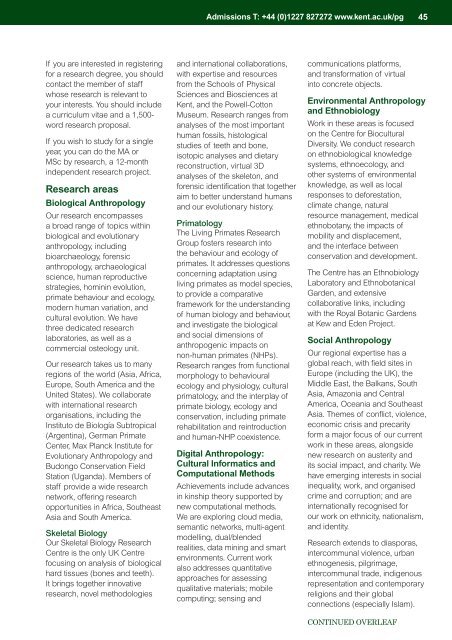prospectus
You also want an ePaper? Increase the reach of your titles
YUMPU automatically turns print PDFs into web optimized ePapers that Google loves.
Admissions T: +44 (0)1227 827272 www.kent.ac.uk/pg<br />
45<br />
If you are interested in registering<br />
for a research degree, you should<br />
contact the member of staff<br />
whose research is relevant to<br />
your interests. You should include<br />
a curriculum vitae and a 1,500-<br />
word research proposal.<br />
If you wish to study for a single<br />
year, you can do the MA or<br />
MSc by research, a 12-month<br />
independent research project.<br />
Research areas<br />
Biological Anthropology<br />
Our research encompasses<br />
a broad range of topics within<br />
biological and evolutionary<br />
anthropology, including<br />
bioarchaeology, forensic<br />
anthropology, archaeological<br />
science, human reproductive<br />
strategies, hominin evolution,<br />
primate behaviour and ecology,<br />
modern human variation, and<br />
cultural evolution. We have<br />
three dedicated research<br />
laboratories, as well as a<br />
commercial osteology unit.<br />
Our research takes us to many<br />
regions of the world (Asia, Africa,<br />
Europe, South America and the<br />
United States). We collaborate<br />
with international research<br />
organisations, including the<br />
Instituto de Biología Subtropical<br />
(Argentina), German Primate<br />
Center, Max Planck Institute for<br />
Evolutionary Anthropology and<br />
Budongo Conservation Field<br />
Station (Uganda). Members of<br />
staff provide a wide research<br />
network, offering research<br />
opportunities in Africa, Southeast<br />
Asia and South America.<br />
Skeletal Biology<br />
Our Skeletal Biology Research<br />
Centre is the only UK Centre<br />
focusing on analysis of biological<br />
hard tissues (bones and teeth).<br />
It brings together innovative<br />
research, novel methodologies<br />
and international collaborations,<br />
with expertise and resources<br />
from the Schools of Physical<br />
Sciences and Biosciences at<br />
Kent, and the Powell-Cotton<br />
Museum. Research ranges from<br />
analyses of the most important<br />
human fossils, histological<br />
studies of teeth and bone,<br />
isotopic analyses and dietary<br />
reconstruction, virtual 3D<br />
analyses of the skeleton, and<br />
forensic identification that together<br />
aim to better understand humans<br />
and our evolutionary history.<br />
Primatology<br />
The Living Primates Research<br />
Group fosters research into<br />
the behaviour and ecology of<br />
primates. It addresses questions<br />
concerning adaptation using<br />
living primates as model species,<br />
to provide a comparative<br />
framework for the understanding<br />
of human biology and behaviour,<br />
and investigate the biological<br />
and social dimensions of<br />
anthropogenic impacts on<br />
non-human primates (NHPs).<br />
Research ranges from functional<br />
morphology to behavioural<br />
ecology and physiology, cultural<br />
primatology, and the interplay of<br />
primate biology, ecology and<br />
conservation, including primate<br />
rehabilitation and reintroduction<br />
and human-NHP coexistence.<br />
Digital Anthropology:<br />
Cultural Informatics and<br />
Computational Methods<br />
Achievements include advances<br />
in kinship theory supported by<br />
new computational methods.<br />
We are exploring cloud media,<br />
semantic networks, multi-agent<br />
modelling, dual/blended<br />
realities, data mining and smart<br />
environments. Current work<br />
also addresses quantitative<br />
approaches for assessing<br />
qualitative materials; mobile<br />
computing; sensing and<br />
communications platforms,<br />
and transformation of virtual<br />
into concrete objects.<br />
Environmental Anthropology<br />
and Ethnobiology<br />
Work in these areas is focused<br />
on the Centre for Biocultural<br />
Diversity. We conduct research<br />
on ethnobiological knowledge<br />
systems, ethnoecology, and<br />
other systems of environmental<br />
knowledge, as well as local<br />
responses to deforestation,<br />
climate change, natural<br />
resource management, medical<br />
ethnobotany, the impacts of<br />
mobility and displacement,<br />
and the interface between<br />
conservation and development.<br />
The Centre has an Ethnobiology<br />
Laboratory and Ethnobotanical<br />
Garden, and extensive<br />
collaborative links, including<br />
with the Royal Botanic Gardens<br />
at Kew and Eden Project.<br />
Social Anthropology<br />
Our regional expertise has a<br />
global reach, with field sites in<br />
Europe (including the UK), the<br />
Middle East, the Balkans, South<br />
Asia, Amazonia and Central<br />
America, Oceania and Southeast<br />
Asia. Themes of conflict, violence,<br />
economic crisis and precarity<br />
form a major focus of our current<br />
work in these areas, alongside<br />
new research on austerity and<br />
its social impact, and charity. We<br />
have emerging interests in social<br />
inequality, work, and organised<br />
crime and corruption; and are<br />
internationally recognised for<br />
our work on ethnicity, nationalism,<br />
and identity.<br />
Research extends to diasporas,<br />
intercommunal violence, urban<br />
ethnogenesis, pilgrimage,<br />
intercommunal trade, indigenous<br />
representation and contemporary<br />
religions and their global<br />
connections (especially Islam).<br />
CONTINUED OVERLEAF



